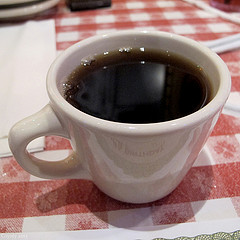Study: Chemical In Coffee Can Help Prevent Your Eyesight From Going

(Coyoty)
Coffee contains 7% to 9% chlorogenic acid (known as CLA), an antioxidant that prevents retinal degeneration in mice, says the study published in the Journal of Agricultural and Food Chemistry.
The retina is a thin layer of tissue on the back wall of the eyeball that contains light-sensitive cells and other nerve cells in charge of receiving and sorting the information you’re seeing. It needs a lot of oxygen to work well and avoid tissue damage, which, combined with free radicals, leads to loss of sight. This can happen due to glaucoma, aging and diabetes, the study explains.
In the study, some mice received nitric oxide treatment to create oxidative stress and free radicals (the things antioxidants fight). Mice treated with CLA didn’t develop any retinal damage, while those that didn’t had signs of retinal degeneration.
Don’t go guzzling away just yet — because CLA is absorbed during the digestive process, researchers are now going to look into whether or not drinking coffee will allow the CLA to cross directly through what’s known as the blood-retinal barrier and into the retina. Or perhaps in the future, synthetic compounds with the magic ingredient could be dropped directly into the eye.
This research is “important in understanding functional foods, that is, natural foods that provide beneficial health effects,” the study’s senior author says in a press release about the work. “Coffee is the most popular drink in the world, and we are understanding what benefit we can get from that.”
Want more consumer news? Visit our parent organization, Consumer Reports, for the latest on scams, recalls, and other consumer issues.

